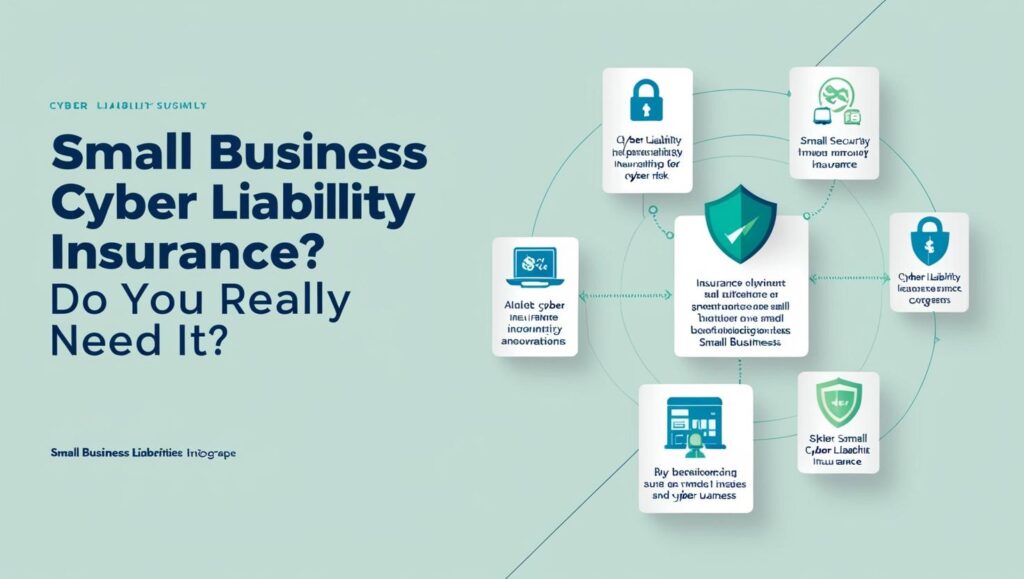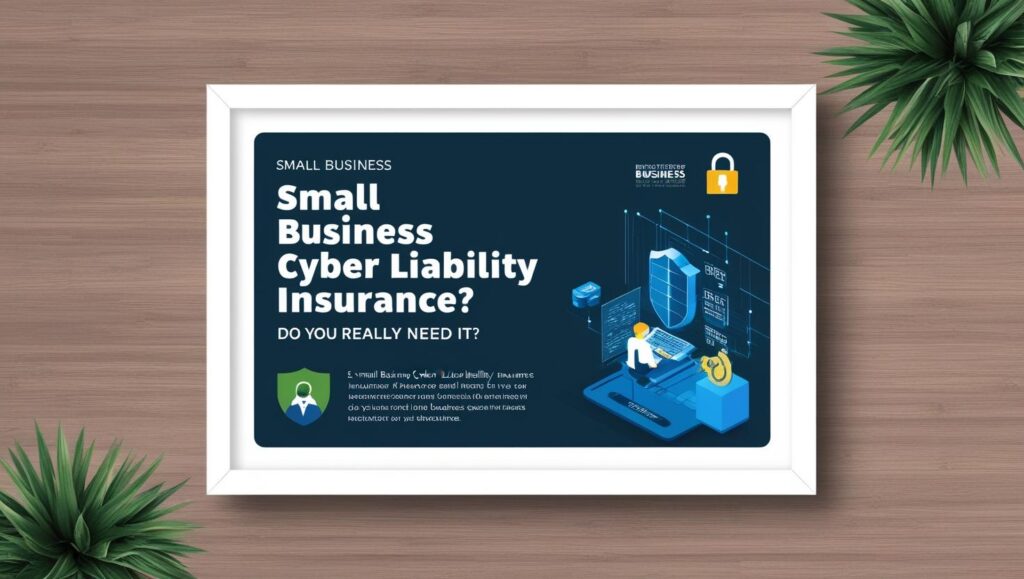Understanding Cyber Liability Insurance for Small Businesses
Cyber liability insurance for small business has become essential in today’s digital landscape. With cyber attacks targeting businesses of all sizes, small companies are increasingly vulnerable due to their typically limited security resources. This comprehensive guide explains everything small business owners need to know about protecting their operations from cyber threats.
According to the U.S. Small Business Administration, 88% of small business owners feel vulnerable to cyber attacks, yet only 28% have invested in proper cyber liability insurance for small business protection. The National Cyber Security Alliance reports that 60% of small businesses that suffer a cyber attack go out of business within six months without proper insurance coverage.
Why Small Businesses Need Cyber Insurance

Small businesses often mistakenly believe they’re too small to be targeted by hackers. However, cybercriminals specifically target smaller operations because they typically have:
- Weaker security protocols
- Limited IT resources
- Valuable customer data
- Connections to larger business partners
The average cost of a data breach for small businesses ranges from $120,000 to $1.24 million, according to IBM’s Cost of a Data Breach Report. Without dedicated cyber liability insurance for small business needs, even a minor security incident can be financially devastating.
Types of Cyber Liability Coverage
Data Breach Coverage
Data breach coverage is a fundamental component of cyber liability insurance for small business protection. This coverage helps with:
- Notification costs to affected customers
- Credit monitoring services for affected individuals
- Public relations expenses to manage reputational damage
- Legal fees related to the breach
- Regulatory compliance costs and potential fines
Most small businesses handle sensitive customer information, making this coverage essential for compliance with data protection regulations like GDPR, CCPA, and industry-specific requirements.
Network Security Coverage
Network security policies protect your business when your systems are compromised. This aspect of cyber liability insurance for small business typically covers:
- Malware attacks and virus removal
- Ransomware payments and recovery costs
- Business email compromise incidents
- Social engineering fraud
- Denial of service (DoS) attacks
According to Verizon’s Data Breach Investigations Report, ransomware attacks against small businesses increased by 300% in the past year, highlighting the importance of this coverage.
Business Interruption Coverage
When cyber incidents disrupt operations, business interruption coverage becomes invaluable. This cyber liability insurance for small business component covers:
- Lost income during downtime
- Extra expenses to continue operations
- System restoration costs
- Data recovery expenses
- Temporary relocation costs if necessary
Small businesses typically experience an average of 7-10 days of downtime following a significant cyber attack, making this coverage critical for financial continuity.
Cyber Extortion Protection
Ransomware has become increasingly sophisticated, with cybercriminals specifically targeting vulnerable small businesses. Cyber extortion coverage includes:
- Ransom payment consultation
- Negotiation with attackers
- Payment facilitation when necessary
- System restoration post-attack
- Preventative measures implementation
The average ransomware demand has reached $170,000 for small businesses according to Coveware’s Ransomware Report.
First-Party vs. Third-Party Coverage
Understanding the difference between first-party and third-party coverage is crucial when selecting cyber liability insurance for small business protection:
First-Party Coverage
First-party coverage addresses direct losses to your business, including:
- Data restoration costs
- Business interruption losses
- Cyber extortion payments
- Crisis management expenses
- System damage repair
This protection focuses on immediate financial impacts to your own operations.
Third-Party Coverage
Third-party coverage protects against claims made by customers, partners, or other external parties:
- Legal defense costs
- Settlements and judgments
- Regulatory investigation expenses
- Media liability claims
- Professional liability related to cyber incidents
The Internet Crime Complaint Center (IC3) reports that third-party claims often exceed first-party losses by 2-3 times, making this coverage equally important.
Costs and Factors Affecting Premiums
The cost of cyber liability insurance for small business varies widely based on several factors:
Business-Specific Factors
- Industry type: Healthcare and financial services face higher premiums due to sensitive data
- Annual revenue: Higher revenue typically means higher premiums
- Number of records: More customer records equate to greater risk
- Security measures: Strong cybersecurity can reduce premiums by 15-30%
- Claims history: Previous incidents may increase costs
Policy Factors
- Coverage limits: Typically ranging from $250,000 to $2 million for small businesses
- Deductible amount: Higher deductibles lower premium costs
- Coverage breadth: More comprehensive policies cost more
- Retroactive coverage: Protection for unknown past breaches increases premiums
- Endorsements: Additional coverages add to base premium costs
According to AdvisorSmith, the average cost of cyber liability insurance for small business ranges from $500 to $5,000 annually for $1 million in coverage, with most small businesses paying around $1,500 per year.
How to Choose the Right Policy
Selecting the appropriate cyber liability insurance for small business requires careful consideration:
Assess Your Specific Risks
- Identify valuable data assets: Customer information, intellectual property, financial records
- Evaluate existing security measures: Firewalls, encryption, employee training
- Consider regulatory requirements: Industry-specific compliance needs
- Analyze third-party relationships: Vendor access to your systems and data
- Review your business continuity plans: Recovery capabilities after an incident
Policy Evaluation Checklist
When comparing cyber liability insurance for small business policies, look for:
- Coverage limits adequate for your risk exposure: Most experts recommend at least $1 million
- Clearly defined covered events: Ensure common threats are included
- Social engineering coverage: Protection against phishing and similar attacks
- Worldwide coverage: Essential if you have international customers
- Vendor/partner actions coverage: Protection if breaches occur through third parties
- Incident response services: Access to cybersecurity experts during a crisis
According to Marsh McLennan, businesses that work closely with insurance brokers specializing in cyber coverage typically secure policies better matched to their specific needs.
Risk Management Strategies
Insurance works best as part of a comprehensive cybersecurity approach. Enhance your cyber liability insurance for small business protection with:
Preventative Measures
- Regular security awareness training: Reduce employee-related incidents by up to 70%
- Multi-factor authentication (MFA): Decreases account compromise risk by 99%
- Data encryption: Protect sensitive information even if systems are breached
- Regular software updates: Patch known vulnerabilities promptly
- Backup systems: Maintain 3-2-1 backup strategy (3 copies, 2 different media types, 1 offsite)
Incident Response Planning
- Develop written response procedures: Step-by-step actions for different scenarios
- Establish communication protocols: Internal and external notification processes
- Create recovery time objectives: Prioritize systems restoration
- Test your plan regularly: Conduct tabletop exercises at least annually
- Work with your insurer: Many cyber liability insurance for small business policies include response planning assistance
The Cybersecurity and Infrastructure Security Agency (CISA) offers free resources to help small businesses develop these protective measures.
Claims Process Explained
Understanding how to file a claim is crucial for maximizing your cyber liability insurance for small business benefits:
Immediate Steps After an Incident
- Document everything: Record the discovery timeline and affected systems
- Notify your insurance provider: Most policies require notification within 24-72 hours
- Follow insurer’s guidance: Many policies provide incident response teams
- Preserve evidence: Don’t destroy potential forensic information
- Implement containment measures: Limit the spread of the attack
Claims Documentation Requirements
Typically, you’ll need to provide:
- Incident details: Timeline, systems affected, data compromised
- Response actions taken: Containment efforts and their results
- Financial impact assessment: Business interruption costs, recovery expenses
- Third-party notifications: Communications with affected customers or partners
- Law enforcement reports: If applicable
According to Coalition, a leading cyber insurance provider, claims filed within the first 24 hours of discovery are settled 35% faster and with better outcomes.
Industry-Specific Considerations
Different industries face unique cyber risks requiring specialized cyber liability insurance for small business coverage:
Healthcare Providers
Small medical practices need coverage for:
- HIPAA compliance violations
- Electronic medical records protection
- Medical device security
- Telehealth vulnerabilities
- Business associate agreements
Retail Businesses
Retailers should focus on:
- Point-of-sale system protection
- Payment card industry (PCI) compliance
- E-commerce platform security
- Customer loyalty data protection
- Supply chain vulnerabilities
Professional Services
Law firms, accountants, and consultants require:
- Client confidentiality breach protection
- Intellectual property safeguards
- Professional liability integration
- Remote work security
- Document management system protection
Manufacturing
Small manufacturers should consider:
- Operational technology protection
- Industrial control system coverage
- Intellectual property theft coverage
- Supply chain risk management
- Production interruption protection
FAQ: Cyber Liability Insurance for Small Business
Q: Is cyber liability insurance required by law for small businesses? A: While not universally mandated by federal law, some industries (healthcare, financial services) have regulatory requirements that effectively necessitate coverage. Additionally, many business contracts now require it.
Q: How is cyber liability insurance different from general liability or professional liability insurance? A: General liability covers physical injuries and property damage, while professional liability covers errors and omissions in services. Cyber liability insurance for small business specifically addresses digital risks and data-related incidents.
Q: Does my business size affect what cyber coverage I need? A: Yes, but not in the way many assume. Even the smallest businesses need comprehensive coverage if they handle sensitive customer data, rely heavily on technology, or would face significant interruption costs from system downtime.
Q: Can I get cyber liability coverage as part of a business owner’s policy (BOP)? A: Many insurers offer basic cyber coverage as BOP endorsements, but these typically provide limited protection. Standalone cyber liability insurance for small business policies generally offer more comprehensive coverage.
Q: How quickly will cyber insurance pay after a claim? A: Timing varies based on incident complexity, but most insurers begin covering incident response costs immediately, with business interruption and other expenses typically settled within 30-90 days after investigation completion.
Q: Will my premiums increase after a claim? A: Most likely, yes. However, demonstrating improved security measures implemented after an incident can help mitigate increases. Some cyber liability insurance for small business policies include premium protection clauses.
Q: Does cyber insurance cover attacks that began before the policy was purchased? A: It depends on whether your policy includes retroactive coverage and the retroactive date specified. Many policies only cover incidents that both occur and are discovered during the policy period.
Q: How often should I review my cyber insurance coverage? A: At minimum annually, but also after significant business changes such as: revenue growth exceeding 25%, new technology implementations, collecting different types of data, or expanding into new markets.
Protecting your small business from cyber threats requires a multi-layered approach, with cyber liability insurance for small business serving as a crucial financial safeguard. As cyber attacks continue to evolve in sophistication and frequency, having appropriate coverage isn’t just sensible—it’s essential for business survival.
Work with an insurance broker experienced in cyber policies to find the right protection for your specific business needs. Remember that the best insurance policy works in conjunction with strong cybersecurity practices to create a comprehensive defense against today’s digital threats.
For more information about cyber liability insurance for small business options, contact the National Association of Insurance Commissioners or speak with a certified cyber insurance specialist who can provide tailored guidance for your industry and business size.
